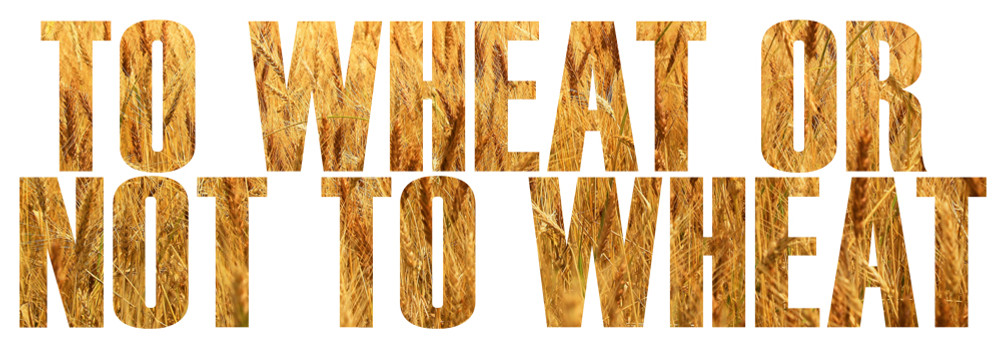
Click image to read this entire article. Wheat. Healthful or harmful? Everybody has an opinion. One thing is certain: wheat is one of the most important staple foods in the world, along with rice and corn. From Genesis (Gen. 30:14) to Revelation (Rev. 18:13) we find references to this ancient cereal grain, used globally in breads, pastas and other foods. With the recent war in Ukraine, an important producer of wheat, we’ve seen dire headlines like “Ukraine War Threatens to Cause a Global Food Crisis”[1] highlighting its significance.
Wheat 101
Wheat supplies a major source of carbohydrates in the human diet in the form of starch, as well as protein. In addition, it contains valuable nutrients like fiber, phytochemicals, vitamins and minerals. The unique quality of its protein, gluten, gives structure and elasticity to baked products like bread and other baked goods.
So what’s all the fuss about? Unfortunately, wheat can be problematic in a number of ways. First, gluten, also found in other grains like rye and barley, is associated with several autoimmune disorders, notably celiac disease. In addition, various non-gluten wheat components make this grain a common allergen. Of increasing concern are individuals with non-celiac gluten sensitivity with symptoms similar to celiac disease and wheat allergy.[2]
Gluten-free for All?
It has been suggested that there are many reasons or misconceptions why the gluten-free diet has become more common. In recent years, interest in gluten-free diets has grown in popularity among those who have reported experiencing gastrointestinal symptoms from exposure to gluten without having celiac disease.[3] Furthermore, public perception increasingly views this diet as healthier and possibly helpful in alleviating nonspecific gastrointestinal symptoms. Additionally, gluten-free products are now more widely available on the market. Others believe that a gluten-free diet will help them lose weight or that current wheat varieties contain more gluten than the older ones.[4]
Although an assortment of gluten-free products is now commonly available in the marketplace, many are made with white rice flour, tapioca starch, cornstarch, or other refined flours. A review of articles on gluten-free diets revealed their lack of fiber, vitamins and minerals and inferiority in nutritional quality.[5] Others have suggested that the promotion of gluten-free diets among people without celiac disease should not be encouraged due to reduced consumption of healthy whole grains, known to lower risk of heart disease.[6] Also, clear evidence linking whole grains to reduced risk of cancer, stroke, diabetes, obesity and other chronic diseases raises concerns about the gluten-free diet. Interestingly, in one study the gluten-free diet was shown to negatively affect the gut microbe balance, and lower immune response when compared with those on a regular diet.[7]
Can the gluten-free diet, then, be well-balanced? The simple answer is, yes, if carefully planned. Importantly, substituting wheat with brown rice, quinoa, or other whole grains instead of refined, low-nutrient-dense, gluten-free products can provide much-needed fiber and other micronutrients in a diet that also includes fruits, vegetables, and legumes.[8]
The Bottom Line
Avoiding gluten is clearly beneficial for those with gastrointestinal symptoms (estimated to be about 6% of the US public[9]); however, evidence is lacking to support the gluten-free diet for those without gluten-related diseases.[10] And finally, inspiration offers us a most reliable guiding principle: “Therefore, whether you eat or drink, or whatever you do, do all to the glory of God.”[11]
[1] Nicas, J. Ukraine War Threatens to Cause a Global Food Crisis. The New York Times. March 20, 2022.
[2] Sabença C, Ribeiro M, Sousa T, Poeta P, Bagulho AS, Igrejas G. Wheat/Gluten-Related Disorders and Gluten-Free Diet Misconceptions: A Review. Foods. 2021;10(8):1765. Published 2021 Jul 30. doi:10.3390/foods10081765
[3] Biesiekierski JR, Newnham ED, Irving PM, Barrett JS, Haines M, Doecke JD, Shepherd SJ, Muir JG, Gibson PR. Gluten causes gastrointestinal symptoms in subjects without celiac disease: a double-blind randomized placebo-controlled trial. Am J Gastroenterol. 2011 Mar;106(3):508-14; quiz 515. doi: 10.1038/ajg.2010.487. Epub 2011 Jan 11. PMID: 21224837.
[4] Sabença, Wheat/Gluten-Related Disorders and Gluten-Free Diet Misconceptions: A Review.
[5] Vici G, Belli L, Biondi M, Polzonetti V. Gluten free diet and nutrient deficiencies: A review. Clinical Nutrition. 35 (2016) 1236-1241
[6] Lebwohl B, Cao Y, Zong G, Hu F B, Green P H R, Neugut A I et al. Long term gluten consumption in adults without celiac disease and risk of coronary heart disease: prospective cohort study BMJ 2017; 357 :j1892 doi:10.1136/bmj.j1892
[7] Sanz Y. Effects of a gluten-free diet on gut microbiota and immune function in healthy adult humans. Gut Microbes. 2010;1(3):135-137. doi:10.4161/gmic.1.3.11868
[8] Jones AL. The Gluten-Free Diet: Fad or Necessity?. Diabetes Spectr. 2017;30(2):118-123. doi:10.2337/ds16-0022
[9] Igbinedion SO, Ansari J, Vasikaran A, et al. Non-celiac gluten sensitivity: All wheat attack is not celiac. World J Gastroenterol. 2017;23(40):7201-7210. doi:10.3748/wjg.v23.i40.7201
[10] Niland B, Cash BD. Health Benefits and Adverse Effects of a Gluten-Free Diet in Non-Celiac Disease Patients. Gastroenterol Hepatol (N Y). 2018;14(2):82-91
[11] 1 Cor 10:31 (NKJV)
